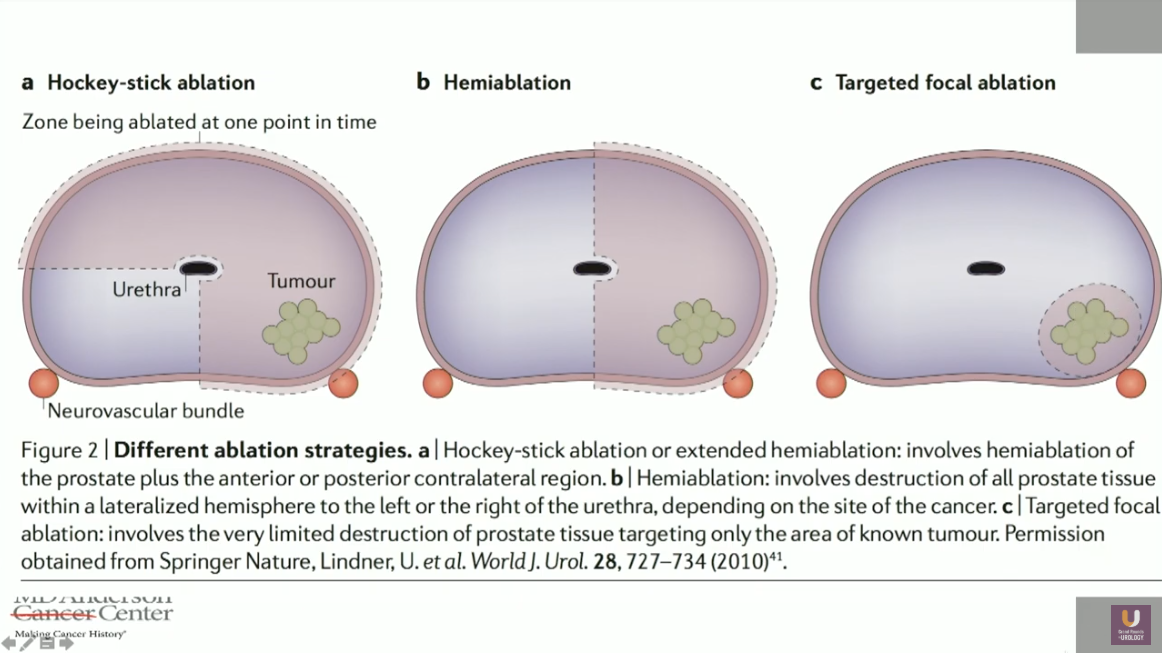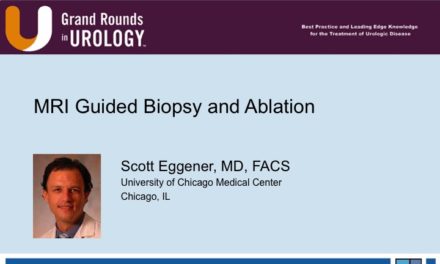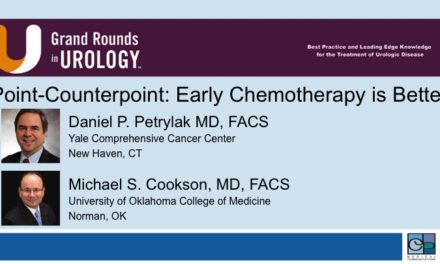John W. Davis, MD, presented “Focal Therapy for Localized Prostate Cancer: Is There a “Middle Ground” Between Active Surveillance and Definitive Treatment? ” during the 29th Annual International Prostate Cancer Update on January 26, 2019 in Beaver Creek, Colorado.
How to cite: Davis, John W. “Focal Therapy for Localized Prostate Cancer: Is There a “Middle Ground” Between Active Surveillance and Definitive Treatment?” January 26, 2019. Accessed Nov 2025. https://grandroundsinurology.com/using-high-resolution-micro-ultrasound-for-prostate-biopsies-for-active-surveillance/
Focal Therapy for Localized Prostate Cancer: Is There a “Middle Ground” Between Active Surveillance and Definitive Treatment?
John W. Davis, MD, discusses the lack of consensus regarding the definitions and benefits of focal therapy for prostate cancer. He defines the patients who would benefit most from focal therapy, as well as overcoming current challenges in this approach.
Abstract:
“Targeted focal destruction of cancer tissue with preservation of surrounding healthy parenchyma” is a definition proposed by Perera et al. for focal therapy. This definition currently overlaps with three different concepts: lesion ablation with a margin, hemiablation, and hemiablation of the prostate plus the anterior contralateral region, or in other words, “hockey stick” ablation.
It is critical to refine these concepts, gather more data on ablation technologies, and uniformly define endpoints of focal therapy.
Likely, focal therapy has a minimal benefit in cancer survival. However, it may be worthwhile, especially in Gleason 3+4 disease, as focal therapy may prevent disease upgrading.
One major dilemma in focal therapy stems from the fact prostate cancer is mostly a multifocal disease. The main method for guiding focal therapy, MRI, currently provides more estimation than precision. A proposed compromise is to perform deep saturation biopsies to select candidates and proceed with either a lesion directed focal therapy with a generous margin, or perhaps hemiablation.
Presently, evidence shows little gain from treating low-risk disease with focal therapy as opposed to definitive therapy or active surveillance. Furthermore, possible oncologic compromise could result from attempting focal therapy in unfavorable-risk/high-risk disease.
About the International Prostate Cancer Update
The International Prostate Cancer Update (IPCU) is an annual, multi-day CME conference focused on prostate cancer treatment updates. The conference’s faculty consists of international experts, and the event caters to urologists, medical oncologists, radiation oncologists, and other healthcare professionals. Topics encompass prostate cancer management, from diagnosis to treating advanced and metastatic disease. Dr. Davis presented this lecture during the 29th IPCU in 2019. Please visit this page in order to learn more about future IPCU meetings.
ABOUT THE AUTHOR
John W. Davis, MD, is a Professor of Urology and Director of the Urosurgical Prostate Program at the University of Texas MD Anderson Cancer Center in Houston. He received his BS in Biology at Davidson College in North Carolina in 1990. He then went on to earn his medical degree at the University of Virginia in 1994 and completed his residency training at Eastern Virginia Graduate School of Medicine in Norfolk. Dr. Davis had fellowship training in prostate cancer research in the Department of Microbiology and Molecular Cell Biology at Eastern Virginia Medical School, and received an American Foundation of Urologic Disease Scholar award for proteomic applications in prostate cancer biomarkers. He completed a Clinical Fellowship in Urologic Oncology at the MD Anderson Cancer Center, and a Fellowship in Laparoscopic Urology at Charité Hospital in Berlin, Germany, under the mentorship of Ingolf Tuerk.
Dr. Davis’ clinical interests include patients with urologic cancers, laparoscopic/robotic surgery, and general urology. His academic interests include quality of life after prostate cancer treatment, outcomes for robotic radical prostatectomy, high-risk prostate cancer trials, active surveillance for prostate cancer, and development of robotic surgical techniques for invasive bladder cancer. He has participated as an investigator in several Southwest Oncology Group and industry-sponsored clinical trials.






